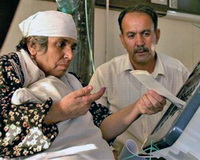Iraq Halts Preparations for January's Parliamentary Elections
Plans to hold Iraqi parliamentary elections in January are once again facing uncertainty, after Sunni Arab Vice President Tariq al-Hashemi indicated that he was vetoing part of the electoral law, passed on November 8. As a result, Iraq's electoral commission says it has halted preparations for the general election scheduled for January.

Word that the Iraqi vice president was vetoing the much debated and only recently passed electoral law casts the specter of raucous new debate and possibly a political vacuum if parliamentary elections are postponed.
Sunni Arab Vice President Tariq al-Hashemi, whose community has complained repeatedly about being marginalized in the post-Saddam Hussein political arena, insists Iraqis living abroad should have greater representation in Iraq's new parliament, Voice of America reports.
Xinhua quoted an anonymous source as saying, "Hashimi vetoed the elections law, objecting the first article of the law that related to the number of seats allocated for Iraqis outside the country."
He said that Hashimi informed the parliament with the veto, throwing January's national polls into question.
Earlier, Hashimi threatened to veto the long-awaited law as he demanded a greater representation for voters outside the country who are mostly Sunni Arabs.
Hashimi's veto threatened to a new possible delay to the country's elections, which according to the Iraqi constitution should take place by the end of January, and could push back the U.S. troop drawdown, Xinhua reports.
It was also reported, Mr Hashemi wanted more seats to be allocated to minorities such as Christians and to Iraqis living in exile or as refugees, particularly since the latter are mainly also Sunni. Under current plans, the two groups have a guaranteed five per cent of the 323 seats, and Mr Hashemi wants that figure increased to 15 per cent.
His decision to veto the law was bitterly criticised by the prime minister, Nouri al-Maliki, who is a Shia. He called it "a serious threat to the political process and democracy".
He added: "The high national interests were not taken into consideration."
But it is not just reconciling Mr Hashemi's demands that is the problem - he himself said that parliament could do so quickly if it desired, Telegraph.co.uk reports.
Subscribe to Pravda.Ru Telegram channel, Facebook, RSS!


